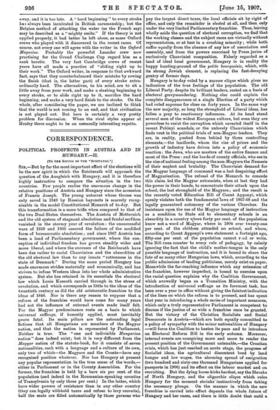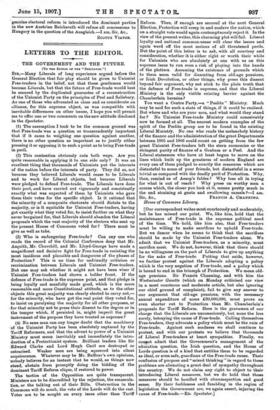CORRESPONDENCE.
POLITICAL PROSPECTS IN AUSTRIA AND IN HUNGARY.—II.
(TO THU EDITOR OF Till .EPROTATOILl
SIE,—But by far the most important effect of the elections will be the new spirit in which the Reichsrath will approach the question of the Ausgleich with Hungary, and it is therefore highly instructive to compare the situation in the two countries. Few people realise the enormous change in the relative positions of Austria and Hungary since the accession of Francis Joseph. The young autocrat whose throne was only saved in 1848 by Russian bayonets is scarcely recog- nisable in the model Constitutional Monarch of to-day. But this transformation is a mere trifle when compared to that of the two Dual States themselves. The Austria of Metternich and the old system of stagnant absolutism and feudal serfdom vanished in the stormy year of revolution the unsuccessful wars of 1859 and 1866 assured the failure of the modified form of bureaucratic absolutism ; and since 1867 Austria has been a land of Parliamentary government, where the con- ception of individual freedom has grown steadily wider and more liberal, and where the excesses of the Reichsmtli have been due rather to racial Chauvinism and the absurdities of the old electoral law than to any innate "rottenness in the state of Denmark." During the same period Hungary has made enormous strides materially and economically, and has striven to infuse Western ideas into her whole administrative 'system. But she has retained in its essentials the electoral law which Louis Kossuth carried through in the stress of revolution, and which corresponds as little to the ideas of the twentieth century as did the old aristocratic franchise to the ideas of 1848. Nor is there any reason to suppose that a reform of the franchise would have come for many years had not the influence of external events made itself felt. For the Magyar predominance rests on a basis to which universal suffrage, if honestly applied, must inevitably prove fatal. Its main pillars are the astounding legal fictions that all Hungarians are members of the Magyar nation, and that the nation is represented by Parliament. Neither is true. The "one and indivisible Hungarian nation" does indeed exist; but it is very different from the Magyar nation of the statute-book, for it consists of seven nationalities, each with a language and a culture of its own, only two of which—the Magyars and the Croats—have any recognised position whatever. Nor has Hungary at present any popular representation in the true sense of the 'words,— either in Parliament or in the County Assemblies. For the former, the franchise is held by a bare six per cent. of the population (and indeed in the Roumanian-speaking counties of Transylvania by only three per cent.) In the latter, which have wider powers of resistance than in any other country '(they can legally withhold taxes and refuse to levy recruits), half the seats are filled automatically by those persons who pay the largest direct taxes, the local officials sit by right of office, and only the remainder is elected at all, and then, only under the very limited Parliamentary franchise. Thus, leaving wholly aside the question of electoral corruption, we find that the working classes and the subject races are virtually without representation, or at best in a crushing minority ; while both suffer equally from the absence of any law of association and assembly, and from the powers exercised by Press juries of exclusively Chauvinist composition. Falsely regarded as a land of ideal local government, Hungary is in reality the happy hunting-ground of the petite bourgeoisie, which, with its strong Jewish element, is replacing the fast-decaying gentry of former days.
Hungary is to-day ruled by a narrow clique which gives no indication of the true feelings of the population. The old Liberal Party, despite its brilliant leaders, rested on a basis of electoral gerrymandering. Nothing else could explain the complete disappearance at a single Election of a party which had ruled supreme for close on forty years. In the same way the new majority, so long the stronghold of Liberal ideas, has fallen a prey to reactionary influences. At its head stand several men of the widest European culture, but even they are powerless to resist the corruption which revealed itself in the recent Polonyi scandals, or the unlovely Chauvinism which finds vent in the political trials of non-Magyar leaders. They are, in reality, pushed from behind by three controlling elements,—the landlords, whom the rise of prices and the growth of industry have driven into a policy of economic reaction: the Jews, who are masters of the entire finance and most of the Press and the horde of county officials, who see in the rise of national feeling among the non-Magyars the Nemesis of their neglect and brutality. The Chauvinist demand for the Magyar language of command was a last despairing effort of Magyarisation. The refusal of the Monarch to concede this claim, led the Magyar extremists, when at last they had the power in their hands, to concentrate their attack upon the school, the last stronghold of the Magyars ; and the result is the recently voted Education Bill of Count Apponyi, which openly violates both the fundamental *laws of 1867-68 and the legally guaranteed autonomy of the various Churches. Its insistence upon the use of the Magyar language of instruction as a condition to State aid to elementary schools is an absurdity in a country where forty per cent, of the population know not a word of Magyar, where in 1904 over twenty-one per cent, of the children attended no school, and where, according to Count Apponyi's own statement a fortnight ago, fifty-one per cent, of the population cannot rsid or write. The Bill runs counter to every rule of pedagogy, by calmly ignoring the fact that the child's mother-tongue is the only possible language of instruction, and it is bound to share the fate of so many other Hungarian laws, which, according to the public admissions of leading politicians, merely exist on paper. Meanwhile the far-reaching influence which any extension'of the franchise, however imperfect, is bound to exercise upon the racial question explains why the Coalition Government, which avowedly began as a Transition Ministry, with the introduction of universal suffrage as its foremost task, has been over a year in office without giving the faintest indication of the lines on which the reform is to proceed, and has spent that year in introducing a whole series of important measures, which only a truly representative Parliament is competent to discuss if the justice of so wide a franchise once be granted. But the victory of the Christian Socialists and- Social Democrats in Austria—which are both equally committed to a policy of sympathy with the minor nationalities of Hungary —will force the Coalition to hasten its pace and to introduce an Electoral Reform Bill in the early autumn. Moreover, internal events are conspiring more and more to render the present position of the Government untenable,—the Croatian crisis, which has just reached an acute stage, the progress-of Socialist ideas, the agricultural discontent bred by land hunger and low wages, the alarming spread of emigration (two hundred and sixty-one thousand Hungarians applied for passports in 1906) and its effect on the labour market and on recruiting. But the dying horse kicks hardest, say the Slovaks of North Hungary, and the oligarchic clique which rules Hungary for the moment shrinks • instinctively from taking the necessary plunge. On the manner in which the new franchise is carried into effect depends the whole future of Hungary and her rams, and there is little doubt that until a
genuine electoral reform is introduced the dominant parties in the new Austrian Reichsrath will refuse all concessions to Hungary in the question of the Ausgleich.—I am, Sir, &c.,
SCOTUS VI.A.TOR.







































 Previous page
Previous page